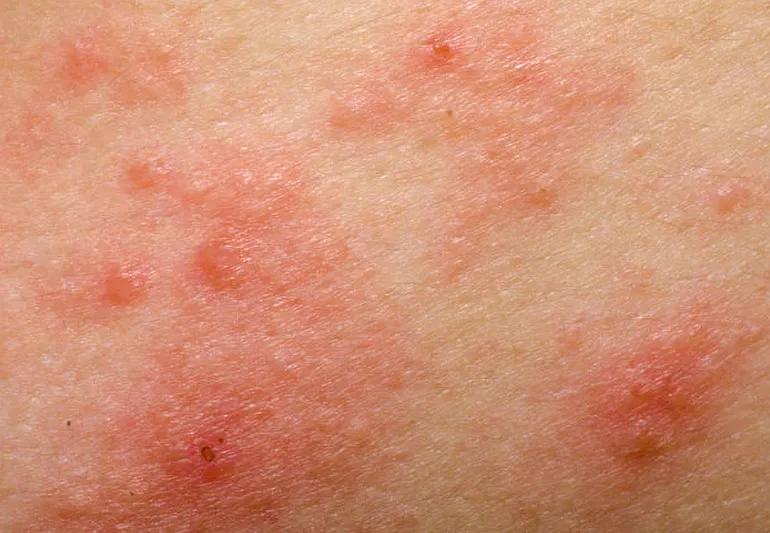Sunscreen alone may not be enough to protect photosensitive skin

Does your skin have an extreme reaction when you spend time in sunlight or artificial ultraviolet light? If so, it may surprise you to know that the medications you take may cause this intense sensitivity. And sunscreen is likely only part of the solution.
Advertisement
Cleveland Clinic is a non-profit academic medical center. Advertising on our site helps support our mission. We do not endorse non-Cleveland Clinic products or services. Policy
“The reaction can present as exaggerated sunburn or as eczema-like red, itchy spots,” says dermatologist Anthony Fernandez, MD, PhD. “And if you think you can protect yourself by loading up on sunscreen, you should know that you’ll probably need more protection than the average person.”
Different medications (including pills and those applied to the skin or injected) cause photosensitivity for different reasons.
“For the most part, the combination of the drug and the ultraviolet light (both UVA and UVB) from the sun generates toxic and inflammatory reactions that are harmful for skin cells,” explains Dr. Fernandez.
The most common reaction, known as phototoxicity, causes a sunburn-like effect on skin when you go out in the sun. Your skin may react shortly after you go out in it or it may take up to 24 hours to show up.
The itchy rash — a photoallergy — isn’t as common. It typically appears a few days after you’re out in the sun. The rash sometimes even shows up on skin that wasn’t directly exposed.
Both prescription and over-the-counter drugs can cause a reaction, including very common ones like ibuprofen and birth control pills.
“Some of the commonly used drugs include antibiotics such as trimethoprim (Bactrim®) or ciprofloxacin and some diabetes medications (including glipizide, glyburide and glimepiride),” Dr. Fernandez says.
Advertisement
Your skin may react to other drugs, too, including:
But that’s not all! There is a wide range of medications that can cause sun sensitivity, from antifungals and cholesterol-lowering drugs to tranquilizers.
If you’re wondering whether or not photosensitivity is a side effect of a medicine you’re currently taking, you can check out the U.S. Food and Drug Administration’s (FDA) list of medications that can cause sun sensitivity.
While there are a lot of medications out there that have the potential to cause phototoxic or photoallergic reactions, whether or not they will can be hard to predict.
According to Dr. Fernandez, two people can take the same medication and one person might see a reaction, while the other doesn’t. To make things still more complicated, your skin may react every time you take the medication and go out in the sun, or it may only happen once.
“People with fair skin, blond or red hair and blue eyes are more sensitive to sunlight in general,” notes Dr. Fernandez. “However, anybody can get an exaggerated sunburn due to medications, regardless of skin color.”
“The best way to minimize these reactions is strict sun protection and avoiding excessive sun exposure,” he advises. “Even sunlight exposure through windows at home or while driving can cause a reaction.”
Sunscreen protects against some harmful rays. According to the American Academy of Dermatology Association, it is most effective if:
Avoid going out in the sun during the peak hours of intensity — between 10 a.m. and 2 p.m. And while sunscreen helps, wearing protective clothing, such as a broad-brimmed hat and long sleeves, is a better strategy to minimize the risk of drug-induced sunburns.
Check with a healthcare provider or pharmacist if you’re not sure whether the medications you take may pose a risk. And remember: Even if you’re not on any medications, you should still always protect your skin when you’re in the sun.
Advertisement
Learn more about our editorial process.
Advertisement

It’s a great disinfectant for around your home, but not for your skin

Changes in texture, smell, color and performance are signs it’s time to throw the cosmetic item away

Strengthening your skin barrier, simple routines and minimizing products are ongoing, popular trends

Moisturizing, running a humidifier and adjusting your showers may help keep itchiness and irritation at bay

Glycolic acid benefits skin tone, texture and pigmentation by exfoliating dead skin

Some gentle soap and warm water go a long way when you’re washing these cosmetic tools regularly

New formulas are less drying and contain water-based and skin-loving ingredients

At a minimum, in the morning, apply a cleanser, followed by a moisturizer and sunscreen, in that order

Wearing a scarf, adjusting your outdoor activities and following your asthma treatment plan can help limit breathing problems

Your diet in the weeks, days and hours ahead of your race can power you to the finish line

When someone guilt trips you, they’re using emotionally manipulative behavior to try to get you to act a certain way